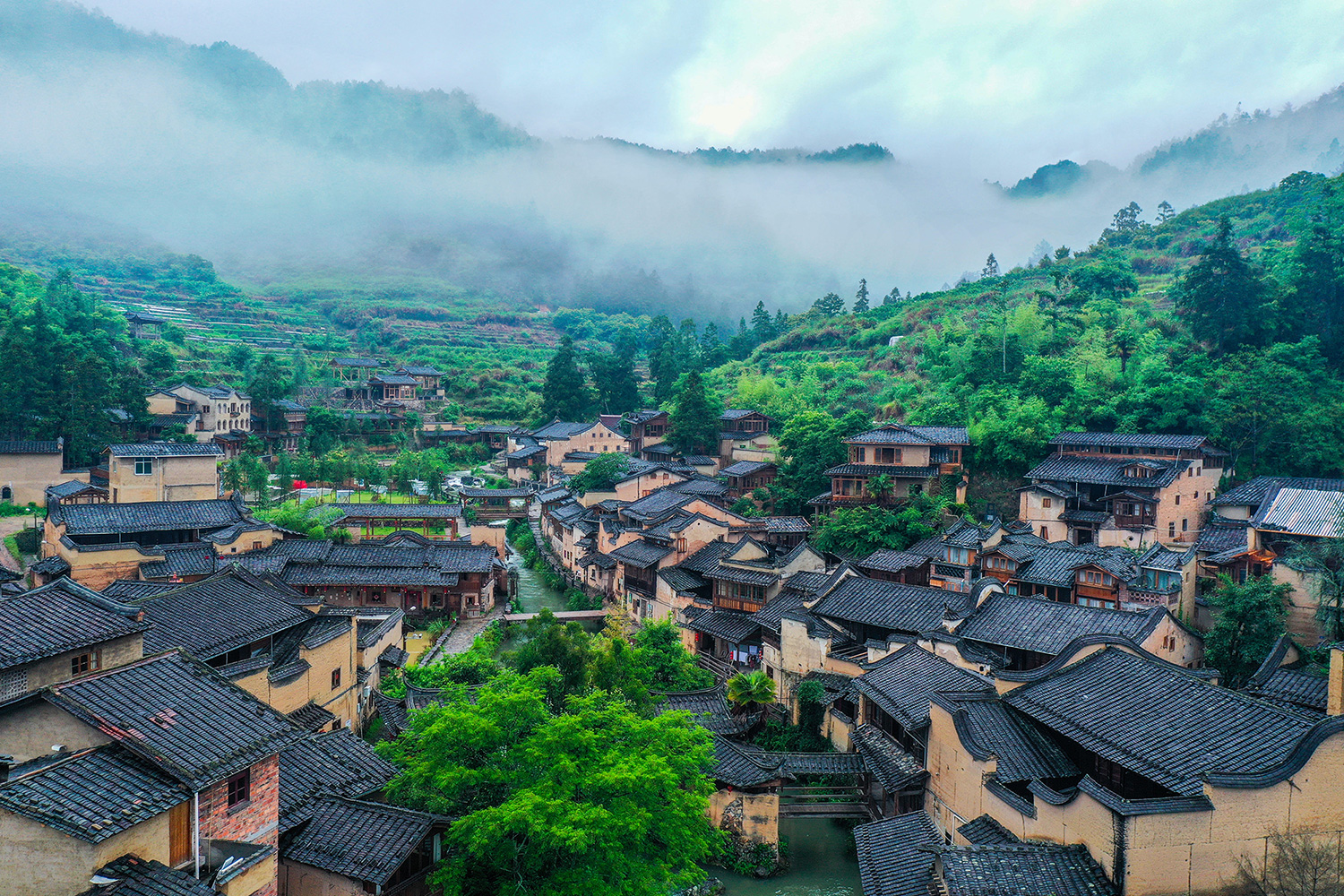

Longtan Village is located in Xiling Township, Pingnan County, Ningde City, Fujian Province, in the eastern part of Pingnan County. Longtan Village is
the third largest administrative village in Xiling Township, Pingnan County, Ningde City. It is located in the eastern part of Pingnan County, bordering
Siping Village and Zhongyang Village in Daixi Town to the east, 10 kilometers away from Daixi Town, Shuizhuyang Village in Jixiang Township, Gutian
County to the west, 12 kilometers away from Tianhuding Wetland, Getou Village to the south, 16 kilometers away from Hetang Town in Gutian, and 11
kilometers away from Sanfeng Village and the location of the township government to the north. The village covers an area of 2 square kilometers,
with a population of over 1000 people and 340 households. It governs 3 natural villages and 16 village groups. Longtan Village was formerly under
the jurisdiction of Gutian County, Fuzhou Prefecture, Fujian Province. It was formerly known as Longtan Village in Xixi, Xibao Township, Qingtian
Township, Qingtian County (now Longtan Village, Xiling Township). Chen Shan Gong, the Mazu of the Chen family in Longtan, moved from Chen
Shan Xia (now Dongshan Village) in Ningde during the Chenghua period of the Ming Dynasty (1465-1487). At that time, Longtan Village had surnames
such as Fu, Yang, Gao, Ye, Zhou, and Wei. The Fu surname fell to Chen Shan and his son Chen Cai, taking care of the elderly life of the villagers Fu
Jiang and Fu Hai, and burying them, inheriting the Fu surname's estate. The surnames Yang, Gao, Zhou, and others have all fallen and disintegrated.
The Wei family moved to Sanfeng Village.
On August 26, 2020, Longtan Village was selected as the second batch of national key villages for rural tourism.

History and Humanities
Longtan "Siping Opera": Chen Machang, the fifth generation of the Chen family, learned "Siping Opera", and Machang's sons, Chen Zhixian and Chen Zhixian, became proficient in "Siping Opera" and began acting to pay tribute to the gods. In the early Qing Dynasty, the Chen family flourished and began to establish their own theater troupe. During the reign of Emperor Qianlong of the Qing Dynasty, the Chen opera troupe was invited to perform in the surrounding areas and other villages, and prepared costumes, gongs, drums, and musical instruments. So he named his class "Kaixiangyun" and performed in Gutian and Ningde, Linxian County. According to the "Pingnan County Annals" revised by Shen Zongliang in the 17th year of the Qianlong reign (1752), it is recorded that on New Year's Day, people pay respects to their ancestors and elders, sound gongs and set off firecrackers, and on the 11th and 12th, the county people perform plays to celebrate and praise. According to the Annals of Pingnan County compiled by Shen Zhongxiu, the Supervisor of the County in the fifth year of Qianlong's reign (1740), "In the milk palace on the mountain head, on the east mountain outside the east gate of the city, there used to be a filial daughter who sued for her father and died here, or a god who took his surname, and the people of the city performed a play in early June to celebrate". At this point, the Longtan "Siping Opera" troupe officially entered the folk market. During the reigns of Jiaqing, Daoguang, and Xianfeng in the Qing Dynasty, people from Longtan Village successively established "Siping Opera" troupes such as "Old Xiangyun," "New Xiangyun," and "Sai Xiangyun. During the Xianfeng period of the Qing Dynasty, Huang Zhengshen, a tribute student, came with his son from Shuangxi Town, where the old city was located, to Longtan Village to watch the "Siping Opera". He walked dozens of miles across mountains and valleys and left behind a poem called "Longtan Village Drama Gift to Chen Taochuan Maocai": "When the water at the gate of the river gurgled, the whole bed was surrounded by mountains on all sides. The beautiful scenery should stop and help people see each other's faces. They celebrated with chickens, millet, and Yuan Bo, and danced in pavilions and hairpin skirts, amazed by the little barbarians. They were so happy that they had two or three children and learned to sing knife rings on their way back. It can be seen that the singing style and performance of "Siping Opera" are very distinctive and captivating. "Siping Opera" has been passed down from generation to generation and still retains its original essence. The precious cultural heritage of "Siping Opera" has also been valued by the country and applied for the World Intangible Cultural Heritage status
Traffic
In 2018, the Xiling Longtan Village Road, which is 12 kilometers long, 6.5 meters wide, and built according to the standards of a Class 4 highway, was
officially opened to traffic. The distance from Longtan Village to Xiling Township was shortened to 12 minutes, and Longtan Village began to vigorously
develop its cultural and creative tourism industry. Today, it has become a well-known "internet famous village" far and wide. Nowadays, Longtan Village
is only 25 kilometers away from the entrance and exit of the Zheyang Expressway on the Pinggu Expressway connection line, and it only takes 30
minutes by car; It only takes a 40 minute drive to Pingnan County, and a 1.5-hour drive to Ningde City and Fuzhou City, making tourism and sightseeing
very convenient.
Architectural Landscape
Longtan Village is surrounded by mountains on all sides, and a small stream flows through the village. The stream is clear to the bottom, spanning
seven stones across the stream. The oldest stone arch bridge at the end of the village was built around the Ming Dynasty, and a bridge house was
built on the bridge deck during the Qing Dynasty. The entire bridge is magnificent. Three natural giant stones stand tall in the stream, creating a
beautiful scenery. It is the "Yingshui Three Piers Standing, Xixi Seven Arch Bridges". The village houses are built in a north-south direction along the
creek. The Xige Highway crosses a small stream and passes through the center of the village, making it the busiest area in the village.
Product Economy
Longtan liquor "is a specialty of Longtan, made by combining refreshing small streams and high-quality glutinous rice from local produce with ancient
techniques to produce yellow wine. It has a strong, sweet, and refreshing taste, and is loved by local and non local people, but is in short supply.
Honors received
On August 26, 2020, Longtan Village was selected as the second batch of national key villages for rural tourism.
In September 2021, it was commended as the "Second Batch of National Rural Governance Demonstration Villages" by the Office of the Central
Leading Group for Rural Work, the Ministry of Agriculture and Rural Affairs, the Central Propaganda Department, the Ministry of Civil Affairs, the
Ministry of Justice, and the National Rural Revitalization Bureau.
In November 2021, it was selected as one of the first batch of "Fresh Fujian, Climate Land" climate health and wellness land lists.
On November 30, 2021, it was proposed to be named "Fujian Province Health Village".
In March 2023, selected for the sixth batch of villages included in the list of traditional Chinese villages.